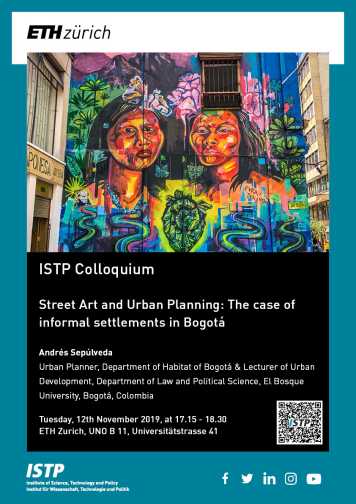Colloquium: Andrés Sepúlveda
Tuesday, 12th November 2019, at 17.15 - 18.30
ETH Zurich, UNO B 11, Universitätstrasse 41
Street Art and Urban Planning: The case of informal settlements in Bogotá

Upgrading processes of informal settlements is always challenging. During more than 20 years the local government of Bogotá has made a great effort to bring public and social services to the territories in order to improve the quality of life of the inhabitants. Citizens also have made a great effort to improve their own neighbourhoods. In spite of that, the processes of building trust between communities and local governments have not always been easy. In order to foster social and urban regeneration in these territories, the municipality has been using street art as a tool to engage with communities and improve the image of neighbourhoods, and to create collaborative workspaces between communities, public servants, local leaders and other key actors in local development process at local level.
During the current administration the Department of Habitat of Bogotá has implemented the strategies Habitarte and Habitando, as a part of the Comprehensive Neighbourhood Improvement Program of the City. The strategies are tools of urban planning and have been a key element for neighbourhood upgrading during the last three years.
The two strategies intend to improve human capacities and strengthen the social fabric of communities through using street art for improving public space in Bogotá´s informal settlements. The strategies create an inclusive environment among key stakeholders, such as the local government, academia, grassroots organizations and the third sector, based on a participatory approach, in which communities play a central role. Another essential goal of these strategies is to bridge the gap between the formal and informal city through an inclusive exchange between different city dwellers.
About Andrés Sepúlveda
Andrés Sepúlveda is a sociologist from the National University of Colombia. He holds two masters' degrees: one in Urban Management and Development, with an emphasis in urban strategies and planning, from the University of Rotterdam and one in Architecture from Los Andes University.
Andrés is currently working at the Department of Habitat of Bogotá, he leads the team in charge of the formulation and monitoring of actions within the framework of the Comprehensive Neighbourhood Improvement Program (Programa de Mejoramiento Integral de Barrios), which is focused in the upgrading of informal settlements in the city. Likewise, Andrés is lecturer of urban development in the Department of Law and Political Science at the El Bosque University. Finally, he is also working with different local government institutions as well as international organizations in order to face, from an inclusive urban planning approach, the challenges associated with the new influx of migrants and refugees from Venezuela in the city of Bogota.
Andrés is interested in understand how local governments are becoming facilitators for the implementation of inclusive initiatives led by the civil society and self- organized groups of citizens committed to the social, economic and spatial transformation of their neighbourhoods. Particularly, through small actions aimed at the regeneration of underutilized public space and other placemaking strategies.
You can read a Summary of the Colloquium Talk on our Reports page.